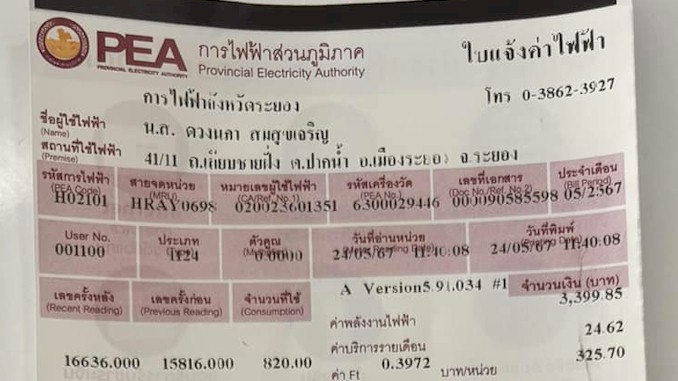Dealing with High Electricity Bills in a Thailand Condo
Living in a beautiful 1-bedroom condo in Thailand, should be a pleasant experience. However, receiving an unexpectedly high electricity bill can be quite a shock. If you’ve found yourself in this situation, with a bill nearing 7,000 baht after just six weeks, it’s time to investigate and take action. Here are some steps and tips to help you manage and reduce your electricity costs.
Understanding the Situation
1. Review the Bill Period
Firstly, check the dates covered by the bill. In your case, the bill seems to cover two months. This could explain the high amount, but further investigation is necessary to ensure you’re not overpaying.
2. Possible Overdue Payments
There’s a chance the bill includes overdue payments from the previous tenant. Verify if this is the case to ensure you’re only paying for your own usage.
3. Air Conditioner Usage
One major contributor to high electricity bills in Thailand is air conditioning. Running the air conditioner for extended periods, especially at low temperatures, can significantly increase your bill.
Steps to Address the High Bill
1. Talk to the Condo Owner
Open a dialogue with the condo owner. Discuss the high bill and the absence of electricity cost details in the rental agreement. It’s essential to understand what’s included in your rent and clarify any ambiguities.
2. Review the Contract
Go through your rental contract to see if there are any mentions of electricity costs. Some contracts may include utility costs within the rent, while others might not. Knowing this can help you understand your financial responsibilities.
3. Check the Bill Details
Scrutinize the bill. Confirm that it indeed covers two months and look for any signs of overdue charges. If possible, compare the current meter reading with the one from when you moved in.
4. Consider Meter Readings
If your condo has an individual meter, compare the readings. If you don’t have the initial reading, request it from the condo owner or the Provincial Electricity Authority (PEA). This can help ensure the bill reflects your actual usage.
Learning About Electricity Rates
1. Understand Local Rates
Electricity rates in Thailand can vary. Familiarize yourself with the rates in place where you stay to better understand your bill. The PEA website or customer service can provide this information.
Additional Tips to Manage Future Bills
1. Meter Reading Photos
When you move into a new place, take photos of the electricity meter readings. Do the same when you move out. This documentation can be invaluable if there are billing disputes.
2. Air Conditioner Usage
Be mindful of how you use the air conditioner. Set it to a moderate temperature and turn it off when you’re not home. Regular maintenance of the unit can also improve its efficiency, reducing electricity consumption.
3. Energy-Saving Practices
Implement energy-saving habits, such as unplugging devices when not in use, using energy-efficient bulbs, and maximizing natural light during the day.
Facing a high electricity bill can be daunting, but by understanding the potential reasons and taking proactive steps, you can manage and potentially reduce your future costs. Always keep an open line of communication with your landlord, understand your rental agreement thoroughly, and be conscious of your energy consumption. These practices will help ensure that living in your Thailand condo remains a pleasant and affordable experience.







